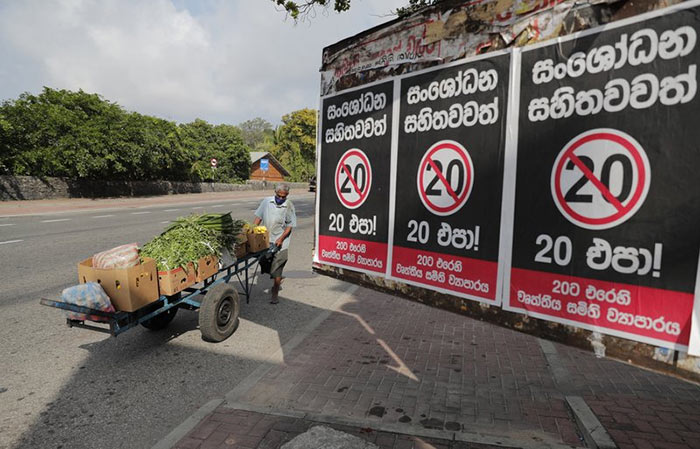Sri Lanka court: Constitutional amendment needs referendum

Sri Lanka’s highest court has ruled that four sections of a proposed amendment to the constitution that would consolidate power in the president’s hands will need approval in a public referendum to become law because they are against the people’s sovereignty.
The Supreme Court’s ruling, announced Tuesday by the parliamentary speaker, said that proposed sections that relieve the president from being responsible to Parliament and give him immunity from lawsuits and the power to dissolve Parliament a year after parliamentary elections are against public sovereignty.
The court said that a referendum would be required if the sections are not appropriately changed.
The constitution now allows the president’s actions to be questioned in court and disallows him from dissolving Parliament until six months before the legislature’s five-year term ends.
The top court, however, has allowed many of the contentious proposals, including giving the president the power to hold any number of ministries, appoint and sack ministers, and appoint top judges and officials to the country’s key institutions.
Parliamentary Speaker Mahinda Yapa Abeywardena said that some sections can be rectified through parliamentary debate, and others according to the Supreme Court’s instructions.
Parliament will debate the amendment on Wednesday and Thursday, and a vote on a rectified bill is scheduled for Thursday evening. Support by at least 150 lawmakers will be needed to pass the amendment, as well as a referendum if required.
The amendment has run into contention with Sri Lanka’s influential Buddhist clergy that backed President Gotabaya Rajapaksa’s election last year, Christian denominations and some ruling party members who oppose them as a move toward making Parliament a nominal body and creating an authoritarian ruler.
With some internal opposition, the government is expected to woo some opposition lawmakers to ensure the amendment is passed.
Sri Lanka has had a powerful executive presidential system since 1978, but a reformist government elected in 2015 reduced much of the presidential powers and gave them over to Parliament and independent commissions.
(AP)
Latest Headlines in Sri Lanka
- Harry Jayawardena passes away February 3, 2025
- Defence Ministry denies claims of President using Air Force aircraft February 3, 2025
- Tension erupts in Moratuwa after cooperative election celebration turns chaotic February 2, 2025
- India allocates INR 3 billion in aid to Sri Lanka in 2025 Budget February 2, 2025
- Skyrocketing prices make cars unaffordable in Sri Lanka despite lifting vehicle import ban February 1, 2025



No worries,
Go for the Referendum.
Additional 100,000 jobs in Govt, 20A will get 90% of the vote in the Referendum.
The president having the power to dissolve parliament early is good. 2 & 1/2 years is ideal ( 50% of their term). If the parliament does not perform, then he should be able to dissolve it early. Other-wise, people have to wait for 4 & 1/2 years to change it ? By that time, parliamentarians will enjoy their privileges, perks, pensions & permits,etc, as usually done in the past. This power to president is an stimulas for the parliamentarians to work and show results ! There should be some fear among them about their jobs & responsibilities. Not a people’s licence to claim benefits !